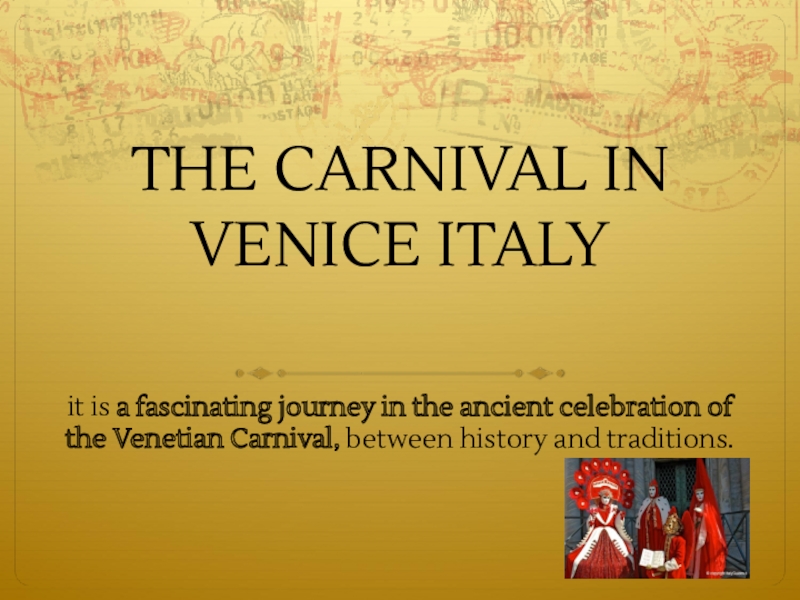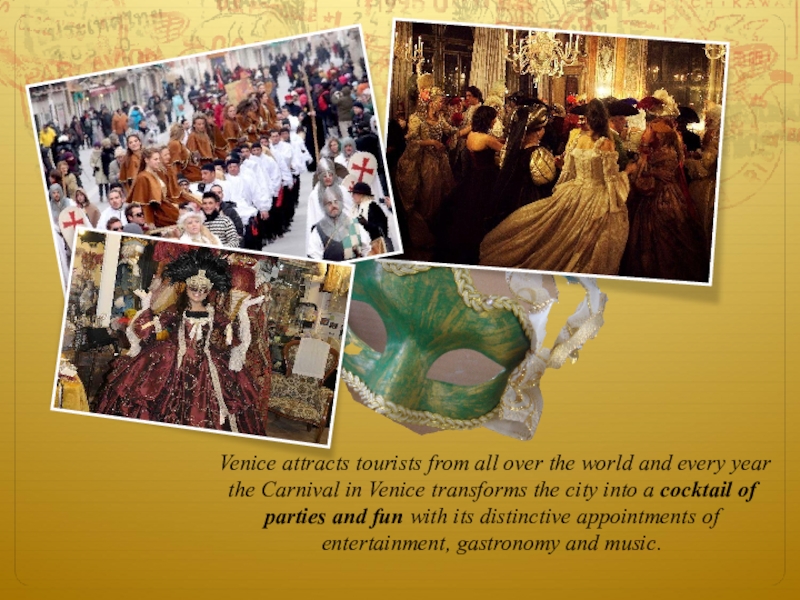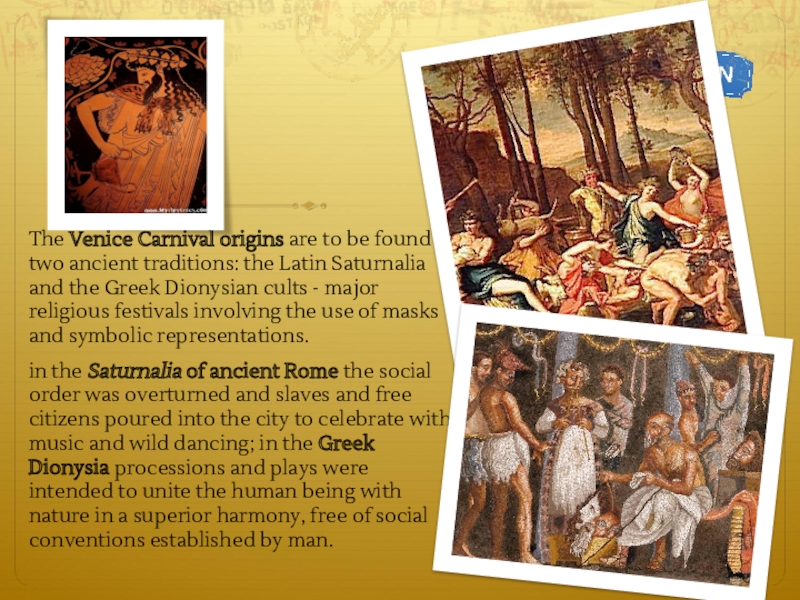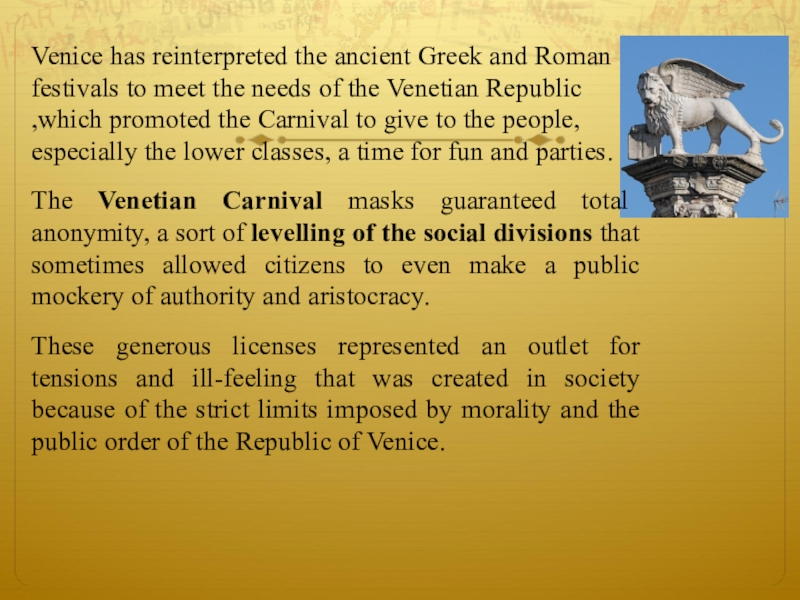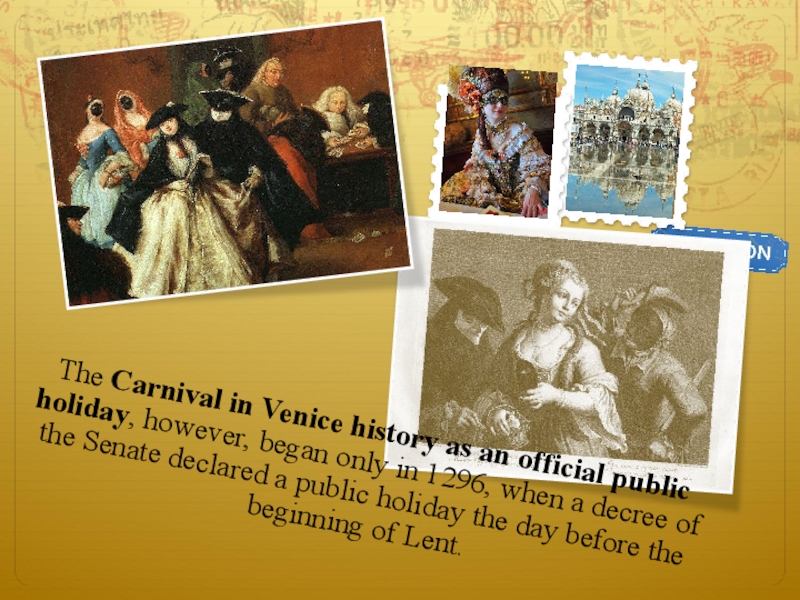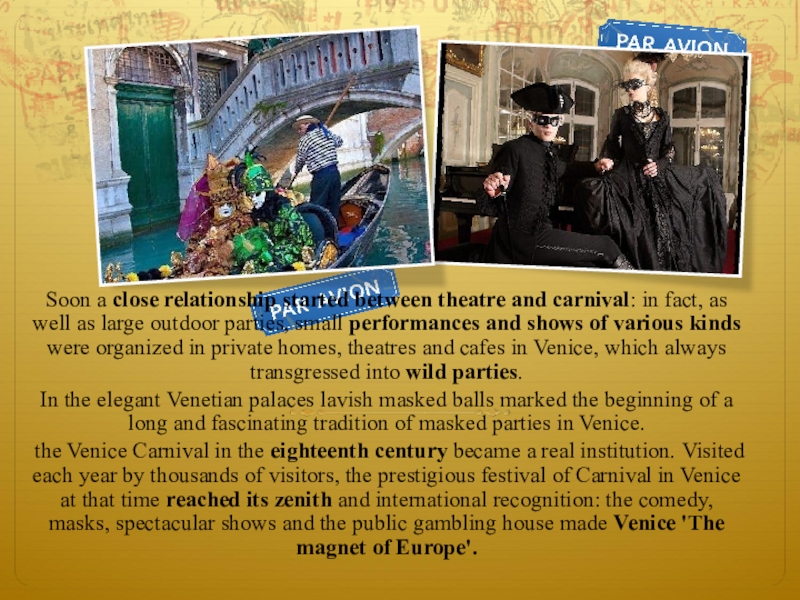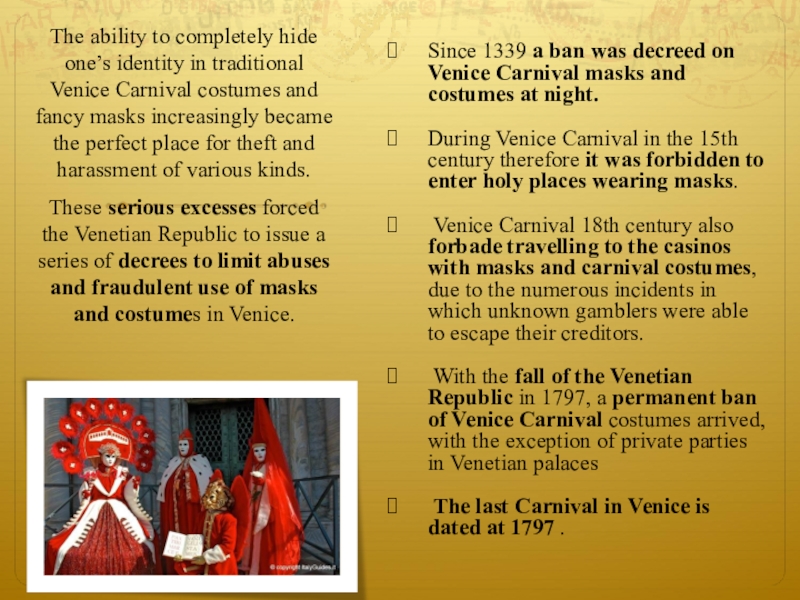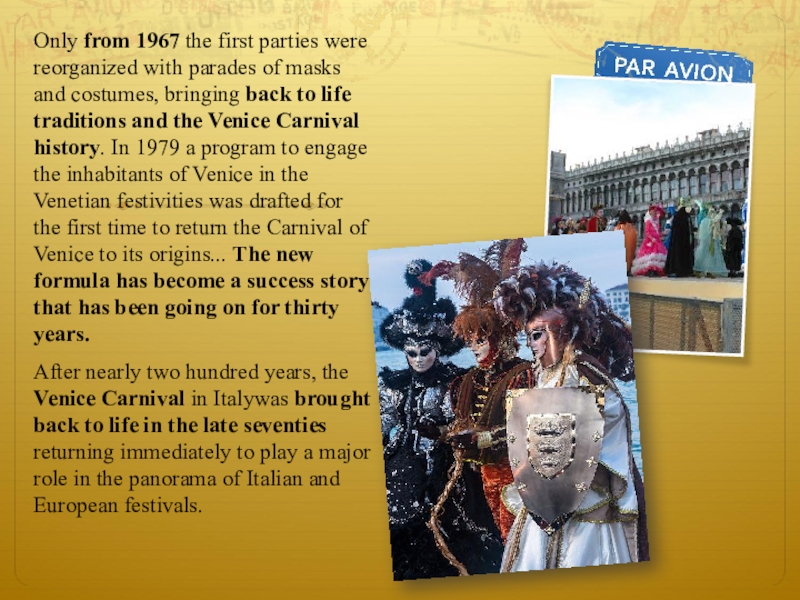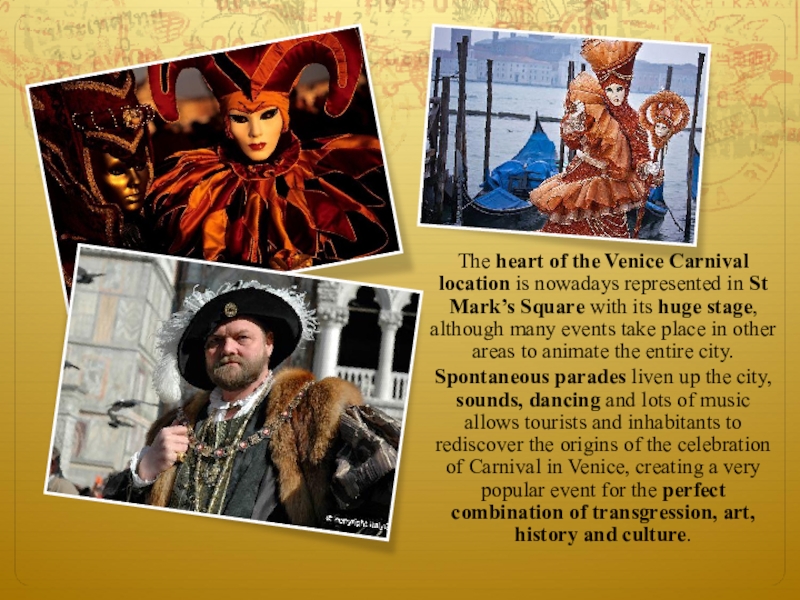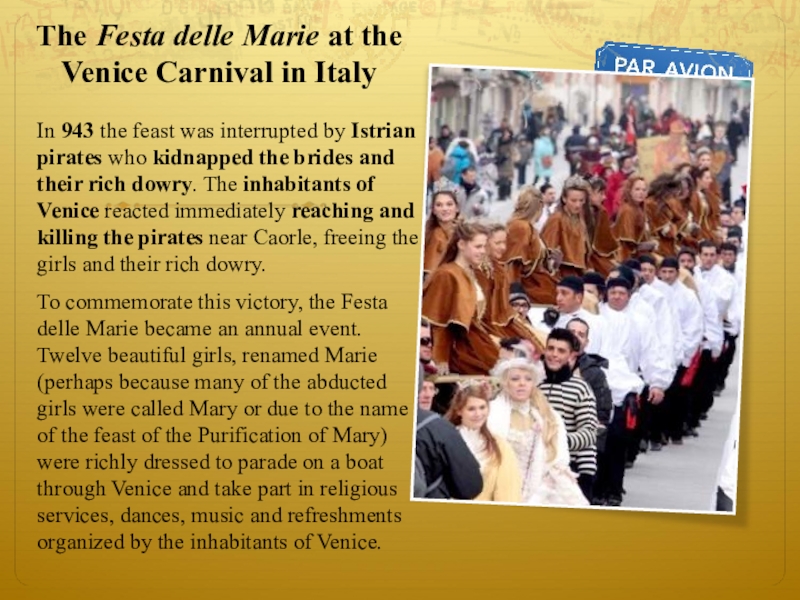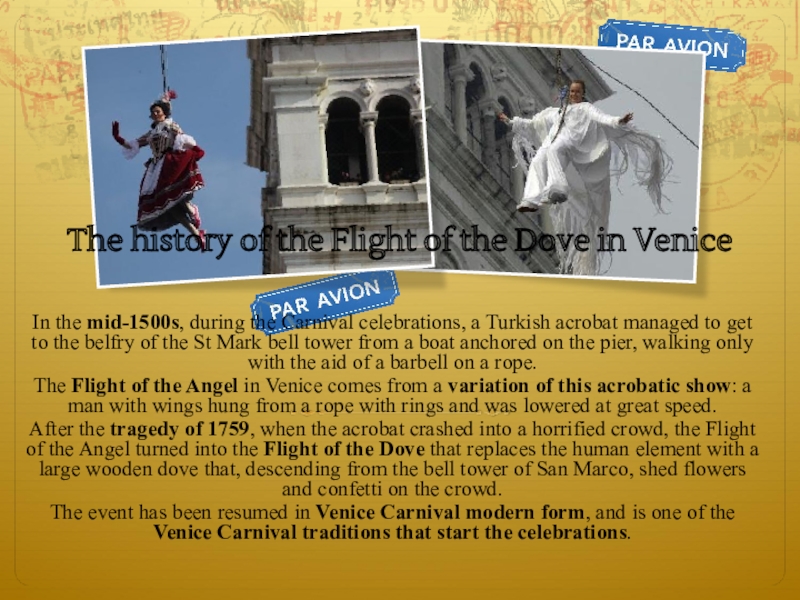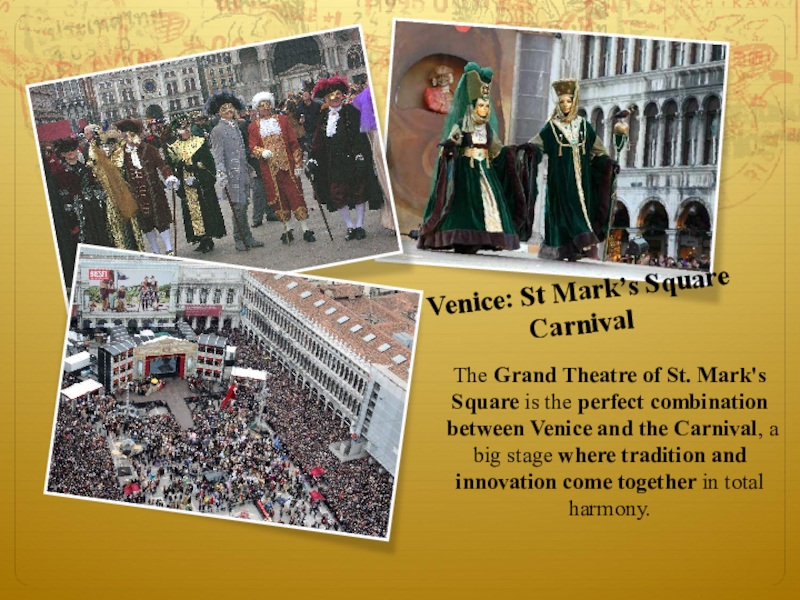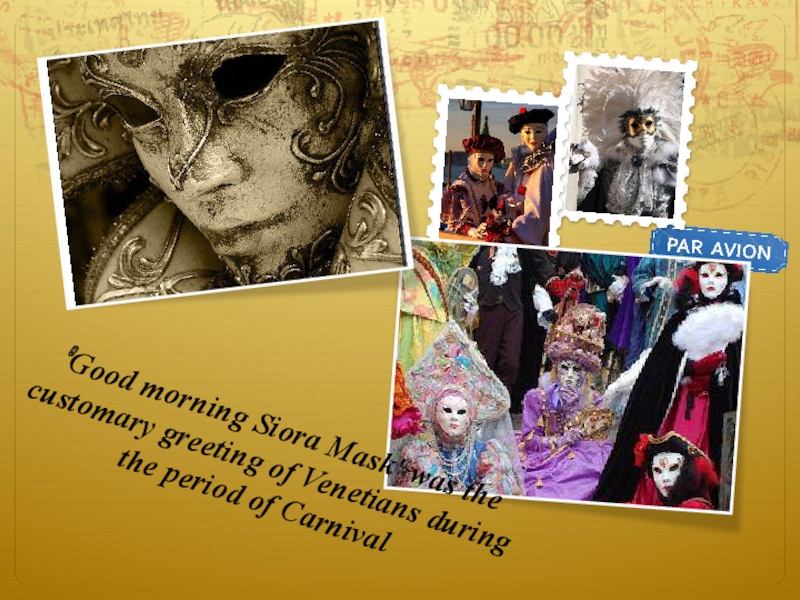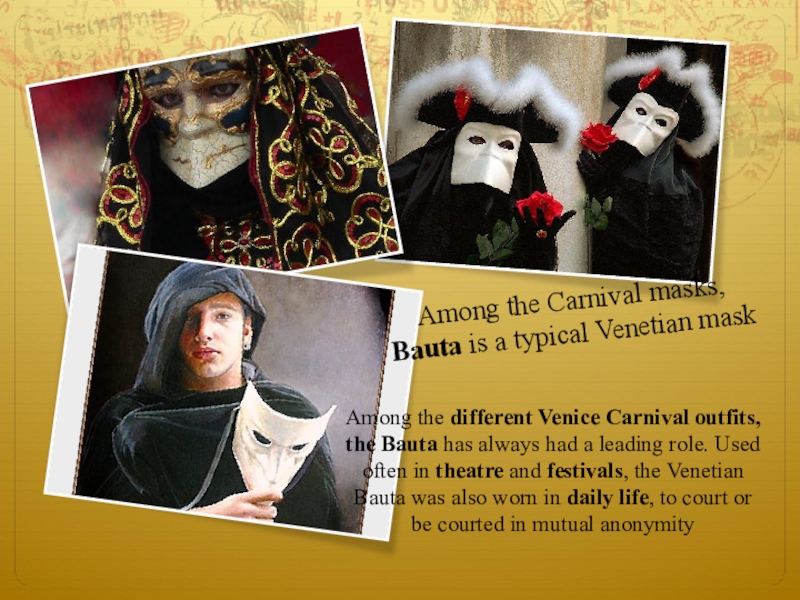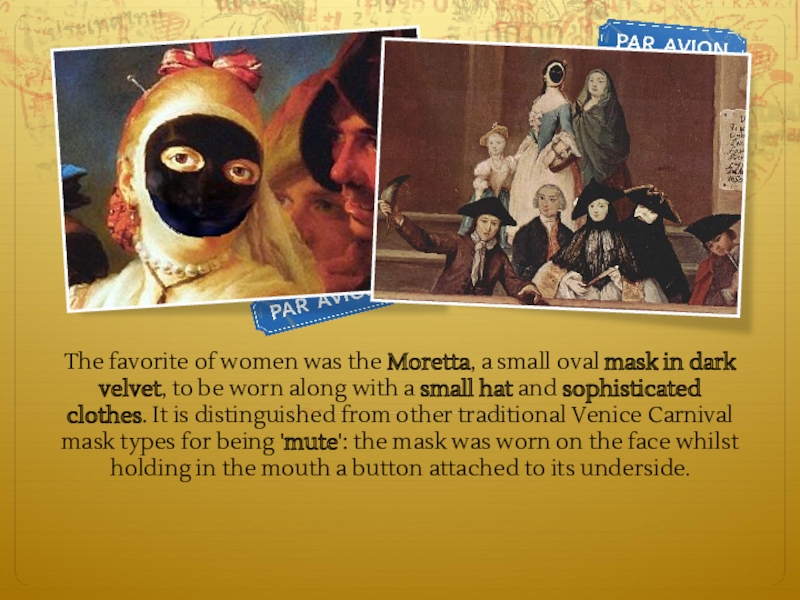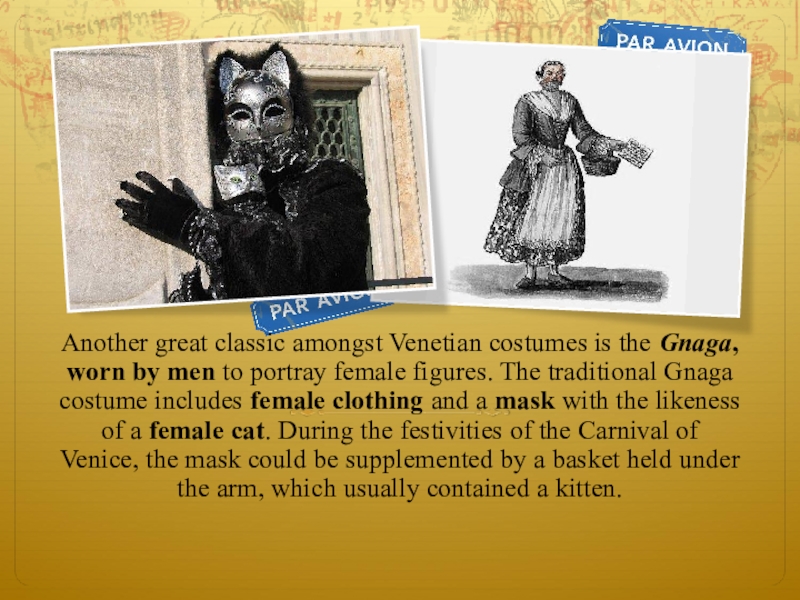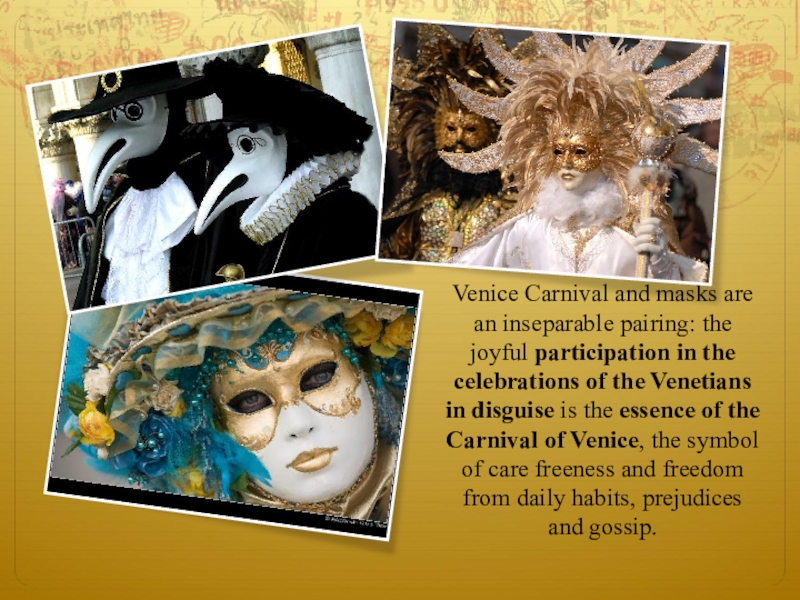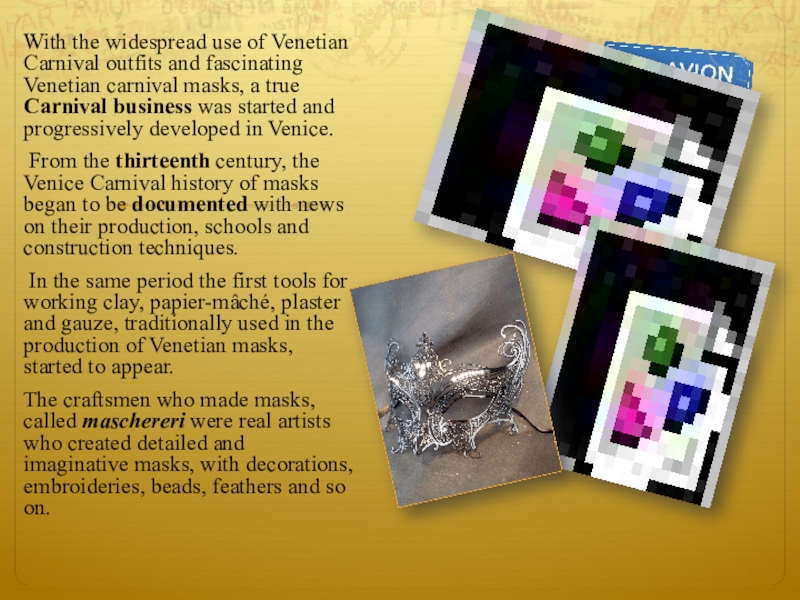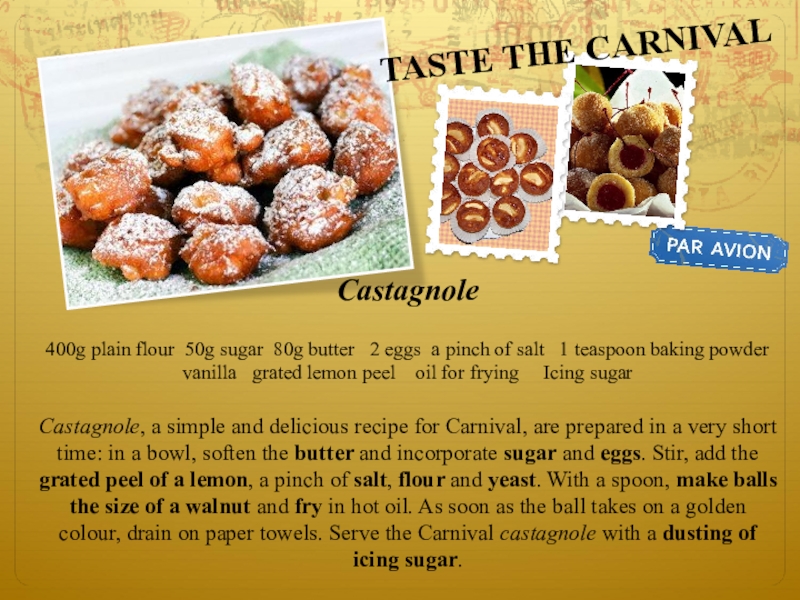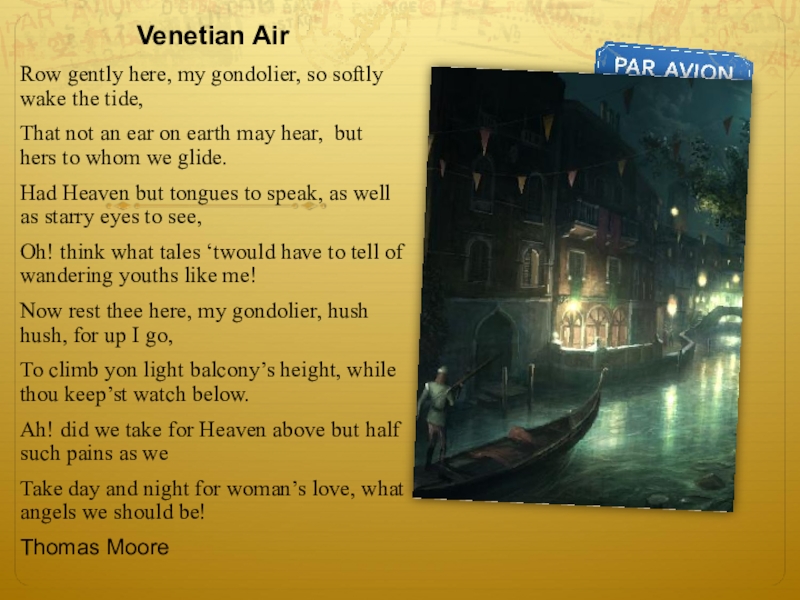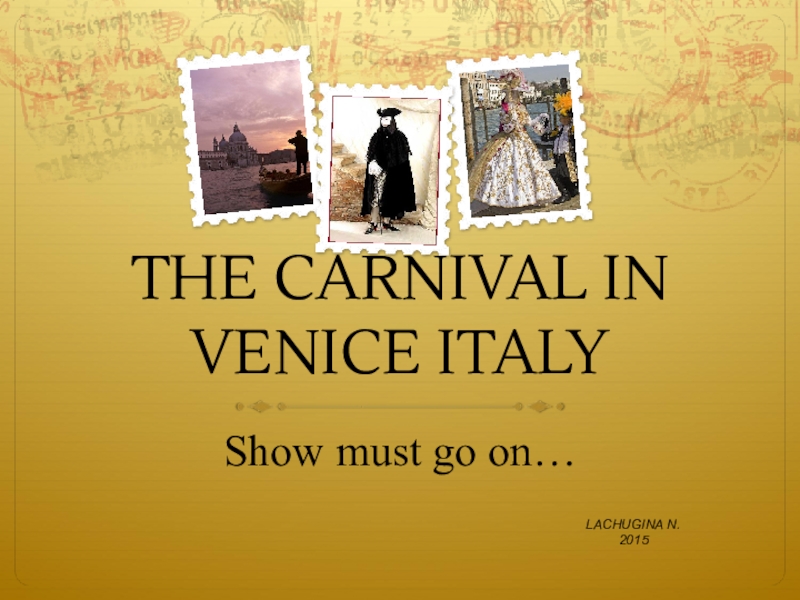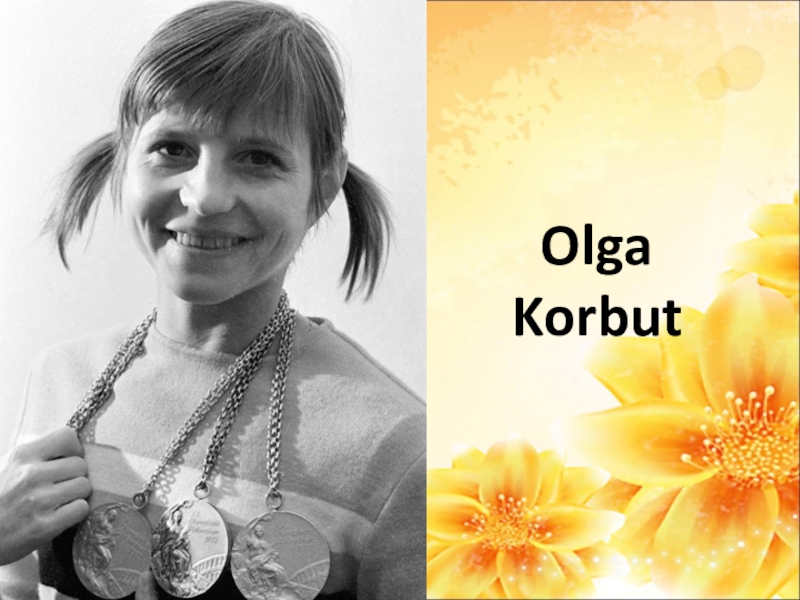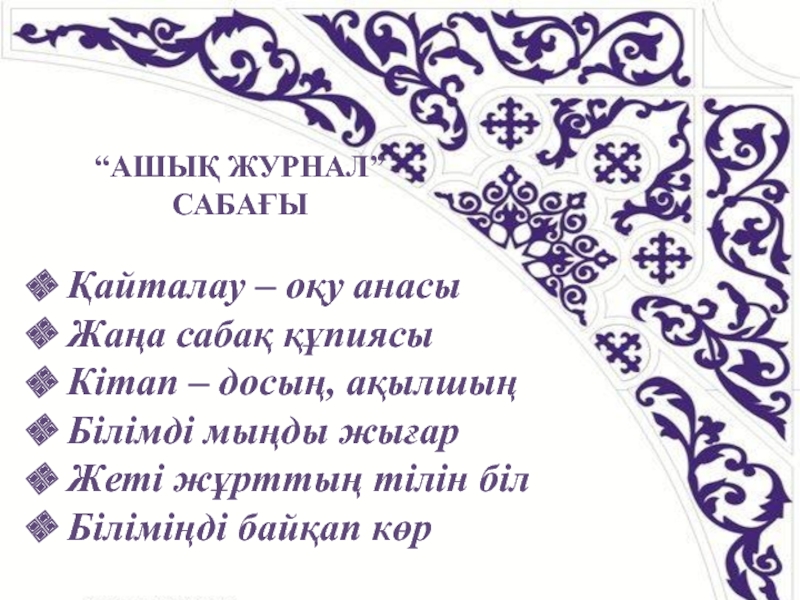- Главная
- Разное
- Образование
- Спорт
- Естествознание
- Природоведение
- Религиоведение
- Французский язык
- Черчение
- Английский язык
- Астрономия
- Алгебра
- Биология
- География
- Геометрия
- Детские презентации
- Информатика
- История
- Литература
- Математика
- Музыка
- МХК
- Немецкий язык
- ОБЖ
- Обществознание
- Окружающий мир
- Педагогика
- Русский язык
- Технология
- Физика
- Философия
- Химия
- Шаблоны, фоны, картинки для презентаций
- Экология
- Экономика
Презентация, доклад к уроку английского языка на тему Карнавалы праздники
Содержание
- 1. Презентация к уроку английского языка на тему Карнавалы праздники
- 2. Venice attracts tourists from all over the
- 3. The Venice Carnival origins are to be
- 4. Venice has reinterpreted the ancient Greek and
- 5. The Carnival in Venice history as an
- 6. Soon a close relationship started between theatre
- 7. Since 1339 a ban was decreed on
- 8. Only from 1967 the first parties were
- 9. The heart of the Venice Carnival location
- 10. The Festa delle Marie at the Venice
- 11. In the mid-1500s, during the Carnival celebrations,
- 12. The Grand Theatre of St. Mark's Square
- 13. 'Good morning Siora Mask' was the customary greeting of Venetians during the period of Carnival
- 14. Among the different Venice Carnival outfits, the
- 15. The favorite of women was the Moretta,
- 16. Another great classic amongst Venetian costumes is
- 17. Venice Carnival and masks are an inseparable
- 18. With the widespread use of Venetian Carnival
- 19. Castagnole 400g plain flour 50g sugar 80g butter
- 20. Venetian AirRow gently here, my gondolier, so
- 21. THE CARNIVAL IN VENICE ITALYShow must go on…LACHUGINA N.2015
Слайд 1
THE CARNIVAL IN VENICE ITALY
it is a fascinating journey in the
Слайд 2Venice attracts tourists from all over the world and every year
Слайд 3The Venice Carnival origins are to be found in two ancient
in the Saturnalia of ancient Rome the social order was overturned and slaves and free citizens poured into the city to celebrate with music and wild dancing; in the Greek Dionysia processions and plays were intended to unite the human being with nature in a superior harmony, free of social conventions established by man.
Слайд 4Venice has reinterpreted the ancient Greek and Roman festivals to meet
The Venetian Carnival masks guaranteed total anonymity, a sort of levelling of the social divisions that sometimes allowed citizens to even make a public mockery of authority and aristocracy.
These generous licenses represented an outlet for tensions and ill-feeling that was created in society because of the strict limits imposed by morality and the public order of the Republic of Venice.
Слайд 5The Carnival in Venice history as an official public holiday, however,
Слайд 6Soon a close relationship started between theatre and carnival: in fact,
In the elegant Venetian palaces lavish masked balls marked the beginning of a long and fascinating tradition of masked parties in Venice.
the Venice Carnival in the eighteenth century became a real institution. Visited each year by thousands of visitors, the prestigious festival of Carnival in Venice at that time reached its zenith and international recognition: the comedy, masks, spectacular shows and the public gambling house made Venice 'The magnet of Europe'.
Слайд 7Since 1339 a ban was decreed on Venice Carnival masks and
During Venice Carnival in the 15th century therefore it was forbidden to enter holy places wearing masks.
Venice Carnival 18th century also forbade travelling to the casinos with masks and carnival costumes, due to the numerous incidents in which unknown gamblers were able to escape their creditors.
With the fall of the Venetian Republic in 1797, a permanent ban of Venice Carnival costumes arrived, with the exception of private parties in Venetian palaces
The last Carnival in Venice is dated at 1797 .
The ability to completely hide one’s identity in traditional Venice Carnival costumes and fancy masks increasingly became the perfect place for theft and harassment of various kinds.
These serious excesses forced the Venetian Republic to issue a series of decrees to limit abuses and fraudulent use of masks and costumes in Venice.
Слайд 8Only from 1967 the first parties were reorganized with parades of
After nearly two hundred years, the Venice Carnival in Italywas brought back to life in the late seventies returning immediately to play a major role in the panorama of Italian and European festivals.
Слайд 9The heart of the Venice Carnival location is nowadays represented in
Spontaneous parades liven up the city, sounds, dancing and lots of music allows tourists and inhabitants to rediscover the origins of the celebration of Carnival in Venice, creating a very popular event for the perfect combination of transgression, art, history and culture.
Слайд 10The Festa delle Marie at the Venice Carnival in Italy
In 943
To commemorate this victory, the Festa delle Marie became an annual event. Twelve beautiful girls, renamed Marie (perhaps because many of the abducted girls were called Mary or due to the name of the feast of the Purification of Mary) were richly dressed to parade on a boat through Venice and take part in religious services, dances, music and refreshments organized by the inhabitants of Venice.
Слайд 11
In the mid-1500s, during the Carnival celebrations, a Turkish acrobat managed
The Flight of the Angel in Venice comes from a variation of this acrobatic show: a man with wings hung from a rope with rings and was lowered at great speed.
After the tragedy of 1759, when the acrobat crashed into a horrified crowd, the Flight of the Angel turned into the Flight of the Dove that replaces the human element with a large wooden dove that, descending from the bell tower of San Marco, shed flowers and confetti on the crowd.
The event has been resumed in Venice Carnival modern form, and is one of the Venice Carnival traditions that start the celebrations.
The history of the Flight of the Dove in Venice
Слайд 12The Grand Theatre of St. Mark's Square is the perfect combination
Venice: St Mark’s Square Carnival
Слайд 13 'Good morning Siora Mask' was the customary greeting of Venetians
Слайд 14Among the different Venice Carnival outfits, the Bauta has always had
Among the Carnival masks, Bauta is a typical Venetian mask
Слайд 15
The favorite of women was the Moretta, a small oval mask
Слайд 16Another great classic amongst Venetian costumes is the Gnaga, worn by
Слайд 17
Venice Carnival and masks are an inseparable pairing: the joyful participation
Слайд 18With the widespread use of Venetian Carnival outfits and fascinating Venetian
From the thirteenth century, the Venice Carnival history of masks began to be documented with news on their production, schools and construction techniques.
In the same period the first tools for working clay, papier-mâché, plaster and gauze, traditionally used in the production of Venetian masks, started to appear.
The craftsmen who made masks, called maschereri were real artists who created detailed and imaginative masks, with decorations, embroideries, beads, feathers and so on.
Слайд 19Castagnole
400g plain flour 50g sugar 80g butter 2 eggs a
Castagnole, a simple and delicious recipe for Carnival, are prepared in a very short time: in a bowl, soften the butter and incorporate sugar and eggs. Stir, add the grated peel of a lemon, a pinch of salt, flour and yeast. With a spoon, make balls the size of a walnut and fry in hot oil. As soon as the ball takes on a golden colour, drain on paper towels. Serve the Carnival castagnole with a dusting of icing sugar.
TASTE THE CARNIVAL
Слайд 20Venetian Air
Row gently here, my gondolier, so softly wake the tide,
That
Had Heaven but tongues to speak, as well as starry eyes to see,
Oh! think what tales ‘twould have to tell of wandering youths like me!
Now rest thee here, my gondolier, hush hush, for up I go,
To climb yon light balcony’s height, while thou keep’st watch below.
Ah! did we take for Heaven above but half such pains as we
Take day and night for woman’s love, what angels we should be!
Thomas Moore
